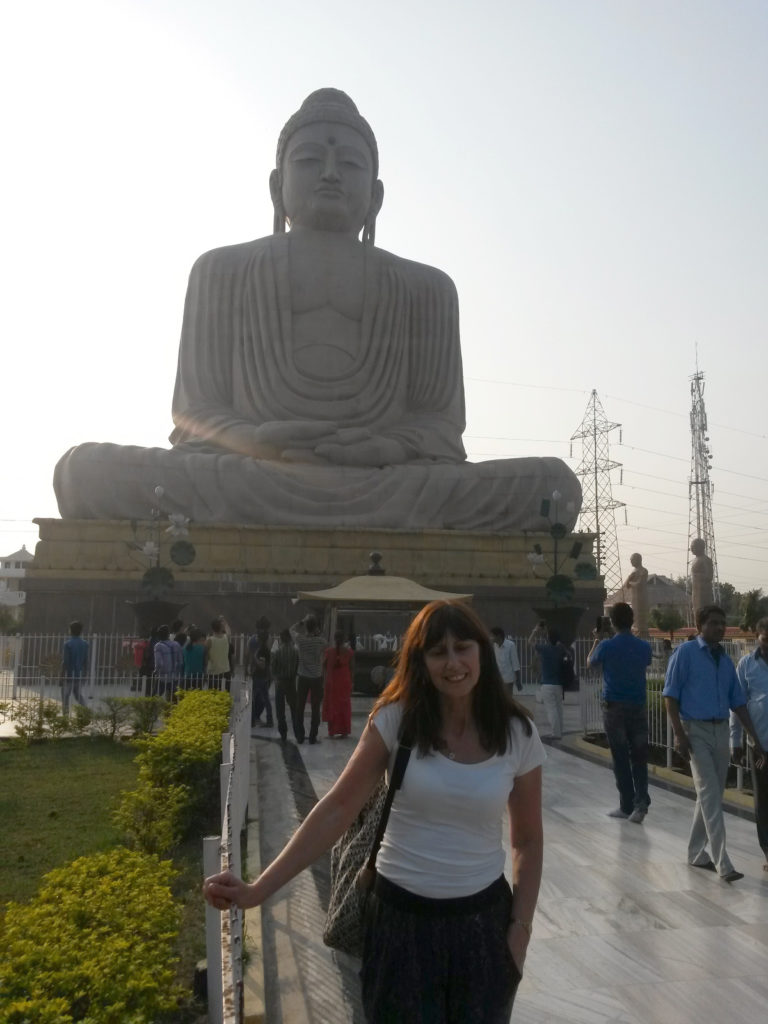Eight Step Recovery - Caroline's Story
This is a picture of me in Bodhgaya in India , the place of the Buddha’s enlightenment. I am constantly learning and moving along my spiritual path of Buddhism.
Four years into my recovery, I came across the Eight Step recovery program which uses the Buddha’s teachings to overcome addiction.
Thinking itself can have an addictive quality. Thinking tells us stories, thinking can make us angry, thinking intoxicated us and impairs the mind . As a result many of us self medicate to take the sting out of our pain.
The Buddha’s teachings offer us an understanding of how the mind works, tools for working with the mind that is vulnerable to addiction. These tools cultivate a clear mind without resentments. With compassion to ourselves and others, these teachings offer mindfulness and relapse prevention.
10 years ago if anyone one told me I would be writing this I would never have believed them . I was desperate. Three failed suicide attempts and my daughter in foster care. I felt totally worthless. I needed to do something about my drinking and eventually I decided to go to an AA meeting.
I immediately felt better after just one day without a drink, it was a fantastic feeling. I was so proud of myself and a day at a time the 12 step program kept me sober. However I struggled with the word GOD used in Alcoholics Anonymous. I felt there was something missing in my life.
I ended up walking through the doors of the Ipswich Buddhist Centre after an absence of 20 years and instantly felt a sense of coming home. After about a month I learned of a book launch and a talk by an order member about addiction and recovery.
Vimalasara has been working in the field of addiction for over 18 years. I was so inspired by her talk that my recovery took on a new dimension.
A few months later I was asked if I would like to learn how to facilitate The Mindfulness Based Addiction Recovery course. This had a huge impact on my own recovery and taught me more about the cycle of addiction and how it can be broken. We were also shown how to peer-lead Eight Step Recovery Meetings.
We now run weekly meetings, studying the Eight Step Recovery book , discussing and sharing. It’s been lovely seeing people gaining so much from the teachings and moving forward in their recovery.
We start the meeting with a three minute breathing space. It’s a short meditation to help us let go of what has been going on in our day. We call it AGE, Awareness Gathering and Expanding the breath throughout the body.
The first Step of the Eight Steps explores suffering. Accepting that this human life will bring suffering. It’s not all doom and gloom. Its just acceptance that life can be unsatisfactory and it’s part of every day life. It’s how we respond to difficult situations and problems.
In Step Two we see how we create extra suffering in our lives. We learn to sit with the pain. We create more suffering when we use our addictions to move away from our pain, the second dart, we add more pain to our already suffering state.
But suffering is impermanent and we look at this in Step Three. We recognise impermanence to show our suffering can end. In recognising and accepting this, we get a sense of freedom. Everything changes, and we discern this in the ever changing seasons
With this freedom we become willing to step on the path of recovery. This is Step Four . Here we look at the cycle of addiction that we need to break. Making changes and choices to create a life without fear, as fear keeps us in the cycle of addiction
Step Five brings us to transforming our speech, actions and livelihood and becoming aware of our ethical life to maintain our abstinence and sobriety of mind. We explore how to make those changes including our values.
Step Six places positive values at the centre of our lives. For me it has been my Buddhist path . So often we put our addictions at the centre of our lives. Here we are exploring how to put positive values at the centre to help inspire us to grow and move forward.
But we need to stay on the path of Recovery and we look at this in Step Seven. Making every effort to do so. By being kind and compassionate to ourselves, seeing the progress we have made. There is no going back.
And we continue the path with Step Eight by helping others, by sharing the benefits we have gained. Learning to help by cultivating faith, energy, mindfulness and wisdom. We don’t teach recovery we radiate recovery.
There is so much to discover in the Buddhist teachings and you don’t need to be a Buddhist to understand. It has changed my life it has helped me go beyond recovery. It has given me a greater sense of freedom and the ability to contribute to the recovery community.

"We don't teach recovery, we radiate recovery"
